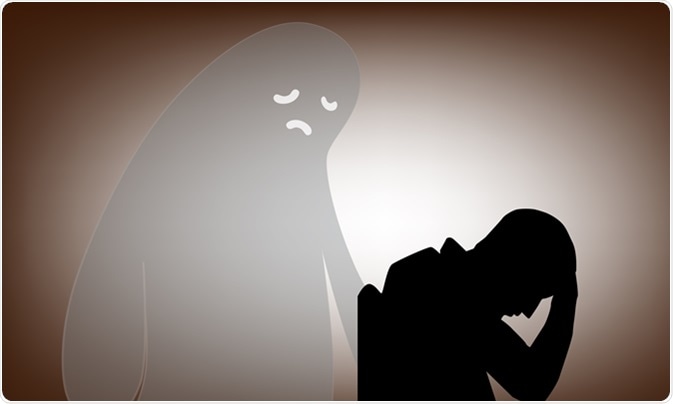Major depressive disorder (MDD), or ‘clinical depression’, is described as feelings of persistent sadness, worthlessness and hopelessness. It is a serious medical condition which affects the way an individual thinks and behaves, impacting the quality of life and day-to-day function.

Depression (major depressive disorder). Image Credit: Nicole Rerk / Shutterstock
What are the symptoms and diagnosis of MDD?
MDD is distinct from general feelings of sadness which are experienced by everyone at some point in their lives. The criteria for diagnosis require that these feelings persists for a period of at least two weeks, with five or more symptoms being present almost everyday, for most of the day.
These symptoms can include:
- A persistent depressed mood
- Excessive feelings of worthlessness and guilt
- Loss of interest in previously enjoyed activities
- Fatigue and lethargy
- Irritability
- Insomnia or hypersomnia
- Unexplained aches and pains
- Changes in appetite leading to weight loss or gain
- Recurrent suicidal ideation
For differential diagnosis, physicians must investigate whether a patient has ever experienced a manic episode, which could indicate bipolar disorder; depressive symptoms could also be related to schizoaffective disorder or other psychotic illnesses. It is important to rule out other medical conditions, which can lead to mood disturbances and mimic the symptoms of MDD, such as thyroid problems or brain tumors.
Who is at risk of developing MDD?
MDD affects approximately 10.4% of adults in the United States within a one-year span, with notable disparities between age groups. The prevalence in people aged 18-29 years is about 2.5 times higher than that in those aged 65 years. it is also twice as high in women compared to men, and this group also has a higher risk of attempted suicide. However, men are more likely to have successful suicide attempts. MDD may surface at any age, with an increased likelihood of onset during puberty.
What are the causes of depression?
A single cause cannot usually be established for MDD. Most often there are a variety of triggering events which occur in an individual's life before the onset of the disorder. These interact with well-established risk factors to increase a person’s susceptibility to depression.
Risk factors for MDD include:
- Genetics – Depression can be hereditary. Immediate family members of those with MDD are two to four times more likely to develop the disorder than the general population.
- Environment – Stressful life events, abuse, childhood trauma, substance misuse and physical illness may make an individual more susceptible to depression.
- Personality – Individuals with pessimistic tendencies and low self-esteem are more prone to developing MDD in response to stressful life events. Neuroticism is a major risk factor.
How is depression treated?
There are many options to treat MDD depending on the severity of the symptoms. Individual success varies for each of these therapies, and the choice of treatment depends on personal preference as well as medical recommendations. The main treatment options are:
- talk therapies
- medication
For mild MDD symptoms, it is wise to wait and see if the symptoms pass after a few weeks. Exercise and self-help strategies such as mindfulness are advised as helpful adjuncts. Talk therapy could also be preferred if the above strategies don’t seem to be working.
For moderate to severe MDD, patients may be referred for psychotherapy such as Cognitive Behavioral Therapy (CBT) which helps individuals understand their thoughts and behaviors, as well as overcome negative thought patterns. In counseling, patients are recommended to talk through their thoughts and issues during sessions. This helps them deal with their problems from a new perspective.
Patients may also be prescribed one of about 30 antidepressant medications to help relieve symptoms. Selective Serotonin Reuptake Inhibitors (SSRIs) are a widely used group of antidepressants; they alleviate depressive symptoms by augmenting serotonin levels in the brain. A combination of psychotherapy and medication is a typical course of treatment for someone with severe symptoms.
Not everyone immediately responds to their prescribed antidepressant; patients often require an increased dose or alternative medications to experience alleviation of symptoms. Side effects vary but commonly include nausea, vivid dreams and dizziness. It has been reported that some people, especially teenagers, experience more suicidal ideation in the first few weeks of taking SSRIs; these are therefore not recommended for this age group. For some patients, the fear of side effects drives them to rely solely on psychotherapy.
Further Reading
Last Updated: Jul 19, 2023